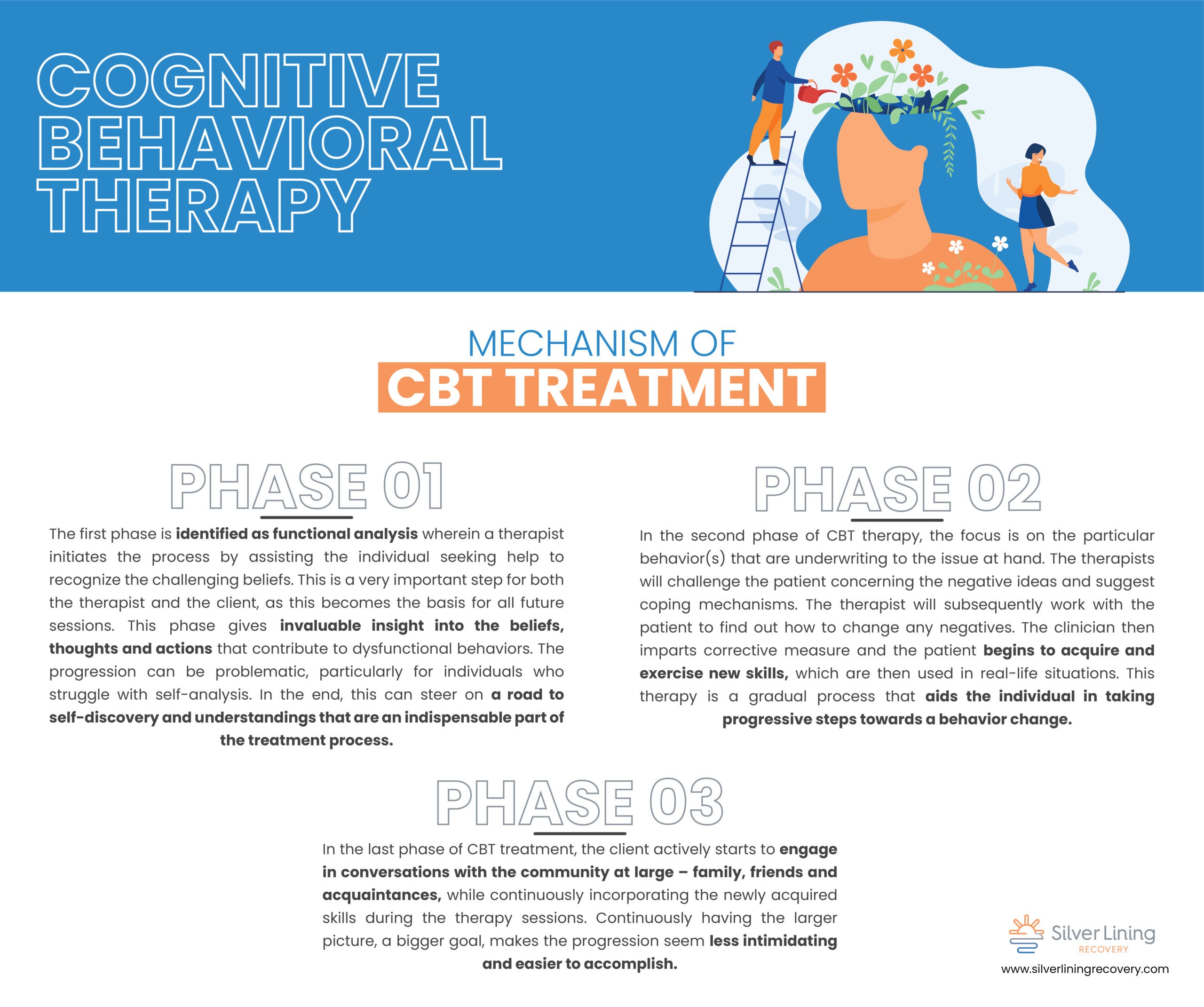

Decoding Cognitive Behavioral Therapy (CBT)
Cognitive Behavioral Therapy (CBT) focuses on stimulating and altering obstructive intellectual distortions of the mind, for example, opinions, principles, and point of views and the overall conduct, for cultivating a positive emotional guideline. It assists in the progress of individual coping stratagems that look to target resolving current issues at hand. The process aims to enhance pleasure and contentment by amending the flawed thoughts, behaviors and emotions. Cognitive Behavioral Therapy is solution oriented in its approach. CBT is a well-established form of psychotherapy, which has been scientifically tested to work in treating a wide selection of disorders, including substance abuse.
CBT therapy is a highly purpose-driven and result focused therapy that makes it time bound and relatively straightforward when it comes to outcome measurability. It is also one of the widely used, preferred and researched forms of therapy.
Like many other therapies, Cognitive Behavior Therapy was originally designed as a measure to tend to depression, but over the years it has been found useful to treat an increasing number of prevalent psychological health ailments, including anxiety, addictions, phobias, anger, depression and eating disorders.
Cognitive Behavior Therapy treatment can be effectively used as a short-term treatment centered on helping the client deal with very specific problems. While behavior therapy can be quite effective, it is not likely to work for everybody. It is also well-suited for people looking for an immediate treatment option for certain types of emotional distress that does not necessarily involve psychotropic medication. CBT could be utilized in combination with pharmaceutical and other therapeutic interventions.
The understanding behind CBT
Cognitive Behavioral Therapy programs are based on the idea that the psychological process involved in the acquisition and understanding of knowledge (thoughts), formation of beliefs and attitudes (emotions), decision making and problem-solving (actions) are interrelated and influence each other greatly.
Thoughts – what we reflect upon affects how we perceive and behave
Emotions – what we perceive affects how we reflect and behave
Actions – how we behave affects how we reflect and perceive
CBT aims to recognize and classify detrimental thoughts, evaluate whether they are a precise representation of reality or not and if they are not, engage tactics to question and ultimately correct and conquer them. In other words, Cognitive therapy helps people to come up with alternative methods of thinking and behaving which intends to decrease their psychological distress.
Mechanism of CBT treatment

What to expect during the Cognitive Behavior Therapy treatment sessions?
Before the start of the treatment, the psychotherapist will assess aspects like the character of the problem being treated and the individual’s personality in tandem to determine the best format for an effective treatment. This form of treatment is extremely customizable.
Throughout the entire process of CBT, the psychotherapist takes the lead and a very active role.
The clinician and the patient work in partnership towards achieving the mutually agreed and established goals. It is unique in that it focuses on one or two specific problem areas and is designed to bring about a rapid reduction in symptoms.
Interpersonal therapy is an integral part of this treatment; group therapy may also be incorporated.
During the sessions, the therapist will take time to explain, in detail, the process and address all the client queries. After which the client will be given home assignments to finish in between sessions.
Men and women who go through therapy learn to identify and correct problematic behaviors by applying an assortment of unique skills that may be employed to prevent drug abuse and to tackle a variety of other issues that frequently co-occur. Therapeutic benefits of the therapy are maximized when people in therapy are wholly committed to the approach and on the therapeutic alliance between the health care practitioner and the individual seeking assistance.
CBT for substance abuse will be able to help the individual to analyze the underlying causes that hastened the vicious cycle and determine any feasible triggers that may result in a relapse. Cognitive Behavioral Therapy for substance abuse is just one of the principal treatments given to patients in rehab. Likewise, CBT treatment for depression would look for the underlying emotions, values and thoughts that form the constant trigger for the case at hand and resolve the associated maladaptive behaviors.
Therapy often decreases in frequency and duration for an individual learns to deal with the causes of her or his addiction and to take care of life’s stressors.
If you are looking to give CBT treatment a try, we at Silver Lining would be happy to help. At our centers in Orange County, California, aspects of cognitive behavioral therapy are frequently used along with different types of mental wellness counseling for a holistic healing that ensures that the problem is effectually handled. We take pride in our experts who effectively use CBT for altering emotions and behaviors that occur automatically and unconsciously.
